Sleep is something every human being needs in order for the body and mind to rest and recover. This is even of greater importance to children as sleep is crucial to the development of their young minds and bodies. However, a lot of children suffer from sleep problems.
This is why parents and doctors over the years have devised various strategies to help make sure that children get enough sleep and address sleep problems they may encounter. With the development of mobile apps, there have been some that try to tackle sleep problems in children.
In this article, I will discuss the Moshi sleep and meditation app for children. I will talk about the app, its features, and how to download and install it on your mobile device. If you want to know more about the Moshi app continue reading below.
- The Importance of Sleep for Children
- Signs that Children Don’t Get Enough Sleep
- How to Handle Sleeping Problems in Children
- Examining the Moshi App for Children’s Sleep and Meditation
- Focusing on the Features of the Moshi App
- Moshi App for Android Devices
- Moshi App for iOS Devices
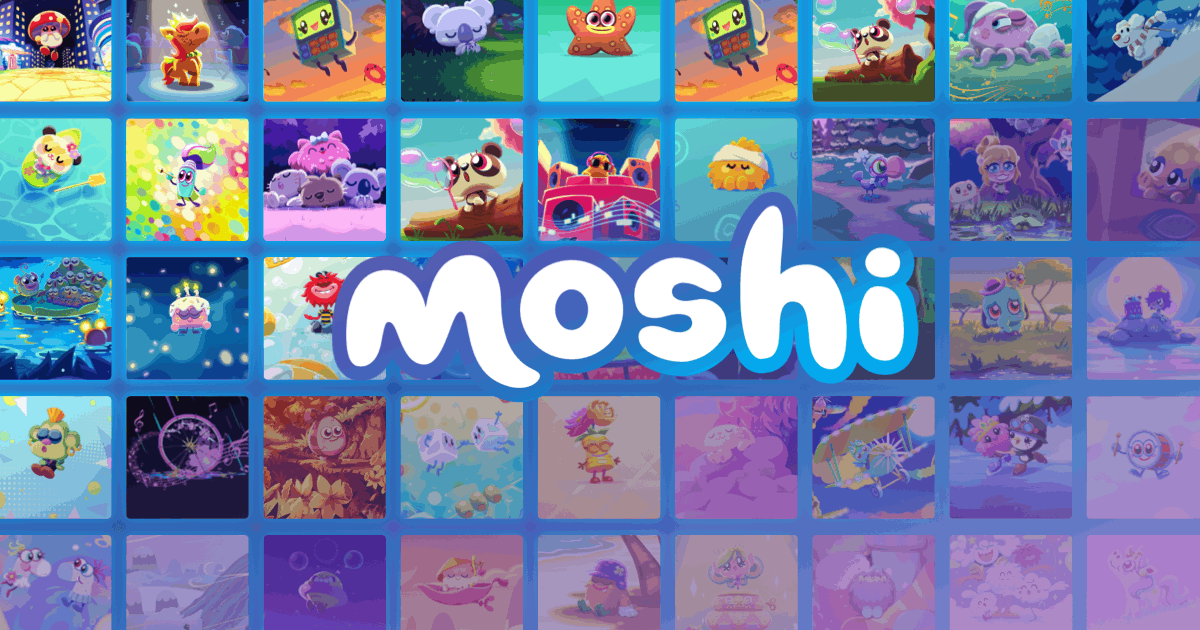
The Importance of Sleep for Children
Sleep is critical to a child’s mental and physical health. However, data from the American Academy of Pediatrics have shown that between 25% to 50% of children have sleep problems.
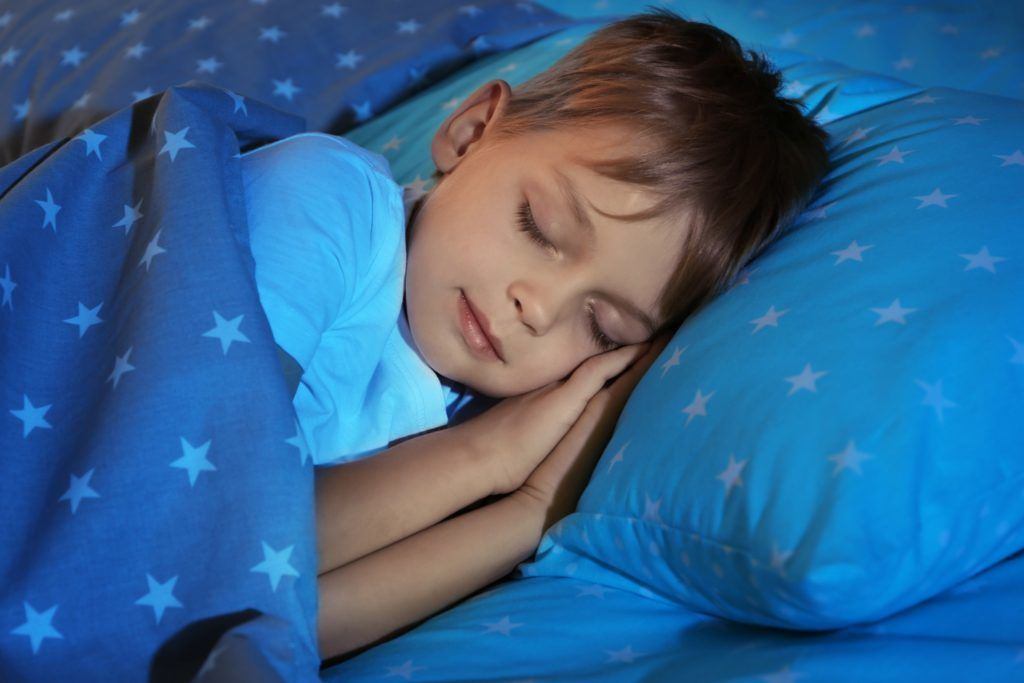
Studies have shown that sleep directly affects children’s cognitive performance, mood, and alertness and attention.
It also plays a role in their learning and memory, resiliency, and vocabulary acquisition.
Sleep’s impact on growth is most crucial in early infancy. Napping in toddlers affects motor skill development, memory consolidation, and executive attention.
Recommended Hours of Sleep Among Children
Depending on their age group, children will require different amounts of sleep and this decreases as they age. Infants need between 12 to 16 hours of sleep, including naps, while 11 to 14 hours is recommended for toddlers.
Meanwhile, children between the ages of three to five years old require 10 to 13 hours including naps but they will only need 9 to 12 hours once they’re in the age bracket of six to 12 years.
Lastly, teenagers or those between 13 to 18 years old are advised to get between eight to 12 hours of sleep on a daily basis.
Signs that Children Don’t Get Enough Sleep
When sleep deprived, children’s behavior and state of mind are often affected. Some children become over-emotional, irritable, or cranky while others find it hard to concentrate at home or in school.
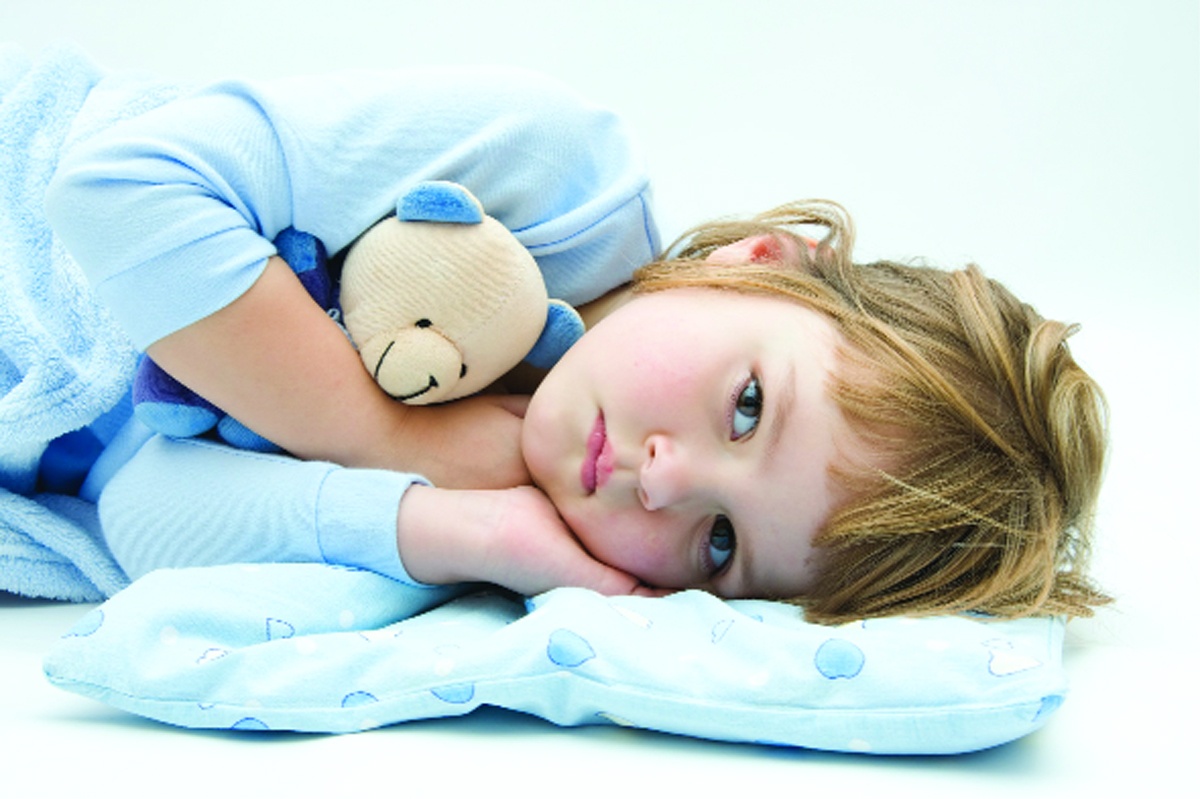
Children who don’t get sufficient sleep may also fall asleep during car rides or may find it difficult to wake up or fall back asleep once they’re up.
They may also seem to space out frequently or struggle following conversations.
Others may often become drowsy or sleepy much earlier than their usual bedtime.
Effects of Lack of Sleep on Children’s Health
Since it is important for children’s development, inadequate amounts of sleep may also have adverse effects on their health. Some children who lack sleep may display ADHD-like behavior.
Inadequate sleep during early childhood has been reported to be linked to allergic rhinitis and immune system problems, along with depression and anxiety.
Studies have also revealed that poor sleep during childhood may cause cardiovascular risks when they grow into adults, such as high blood pressure, obesity, and diabetes.
How to Handle Sleeping Problems in Children
To ensure that children get enough sleep, parents need to establish good habits related to sleeping. One is to ensure that the bed is only used for sleeping so that it won’t be associated with other activities.

The child’s bedroom should be comfortable, particularly its temperature. White noise from a fan or sound machine may be used in case there’s noise coming from outside. Too many toys may also cause distraction.
A sleep schedule should be followed regardless of the weekends so they can naturally fall asleep and wake up.
Also, children should neither be full or hungry when going to bed so a light snack should suffice.
Other Ways to Help Get Better Sleep
While napping is important, it should also be monitored. Children shouldn’t nap for too long or too close to bedtime so that they’ll be tired enough to sleep as scheduled.
Since blue light from electronics such as phones, TVs, tablet, and video game consoles can cause a disruption in the body’s sleep cycle, using them should be restricted. These gadgets should be outside the bedroom during bedtime.
Exercising with parents could also prevent restlessness during the night so an active lifestyle could help with their sleep. Natural light exposure in the morning is also encouraged.
Examining the Moshi App for Children’s Sleep and Meditation
While the methods I mentioned above can be quite effective in helping children get more sleep, some people may be too busy to implement those strategies during the day, especially those that require time and effort.
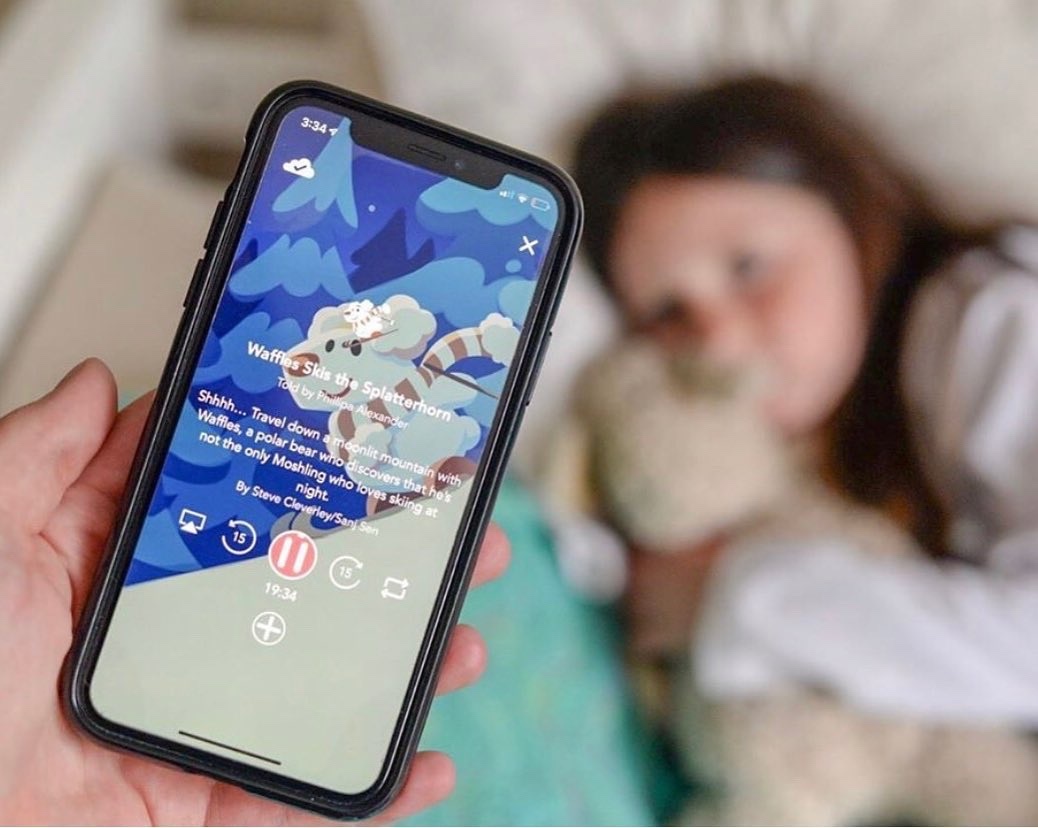
This is the reason why the Moshi mobile app was developed. This audio-only app helps children go to sleep faster and get more hours of rest through audio stories, relaxing music, meditation, and sleep sounds.
According to a study conducted by researchers at the New York University, children fall asleep 28 minutes earlier and 22 minutes longer using the Moshi app. It also decreased night waking by up to half.
Why Parents Should Use the Moshi App
Like I said, some parents or guardians may not have the time to spend on doing the traditional ways to help address sleep problems. This app offers a quick and easy way to try to help children get more sleep.
Since the app is audio-only, it wouldn’t result to increase screen time for children. You can also use a Bluetooth speaker by near their bed to play audio from the app.
The Moshi app also teaches children to sleep alone instead of having someone with them in their bed just to fall asleep. It saves a lot of time for parents and instills a little independence on the little ones.
Focusing on the Features of the Moshi App
The Moshi app has tons of audio content, amounting to more than 85 hours of stories, music, and sleep sounds. Aside from sleep, it can also teach mindfulness through breathing exercises and meditation.
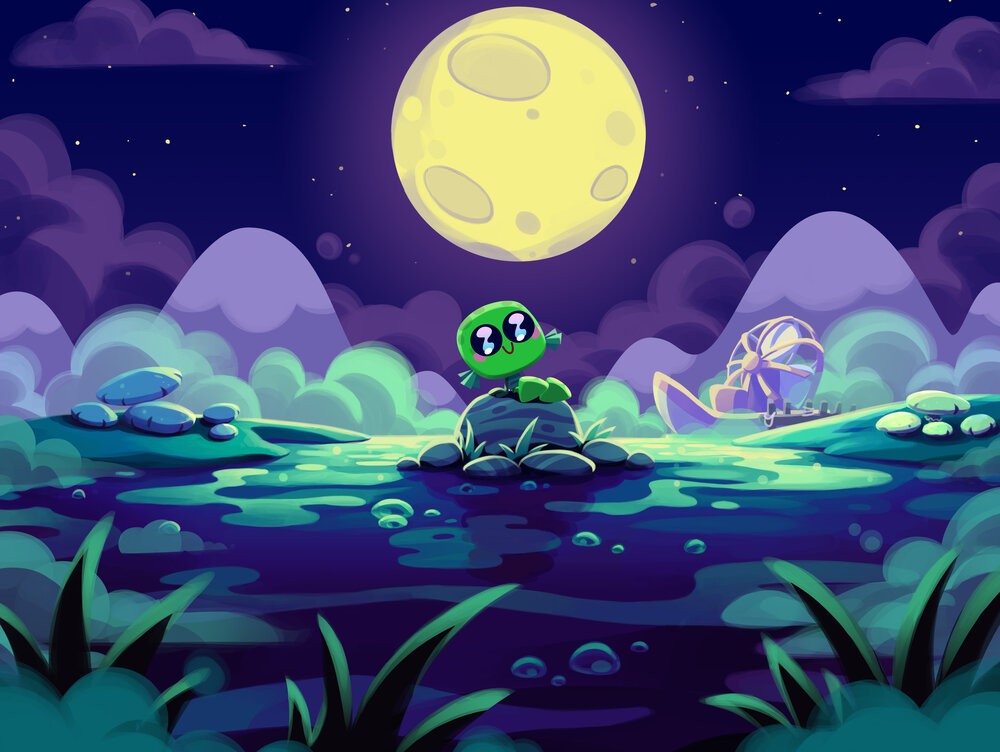
Moshi Stories are relaxing, melodic stories that has music and ambient noises to keep children relaxed. Narration is designed to become sleepier as the story progresses.
Meanwhile, Moshi Sleep Music features original instrumental music that are composed to provide a soothing and relaxing feeling to listeners.
Other Notable Features of the Moshi App
Aside from sleep music, the app also features sleep sounds and white noises that can be used to keep babies sound asleep. These include the classic white noise and even birdsongs.
Since it also teaches mindfulness, the Moshi app also offers a guided meditation that help children think about happy moments.
The app uses several original characters, including SleepyPaws the Snoozy Koala, Yawnsy the Sleepwalking Otter, and Nodkins the Bedtime Bunny.
Moshi App for Android Devices
The app is free to download and install for all platforms. For Android users, you will find it on the Google Play Store in the Parenting category under the name “Moshi: Sleep and Meditation”.
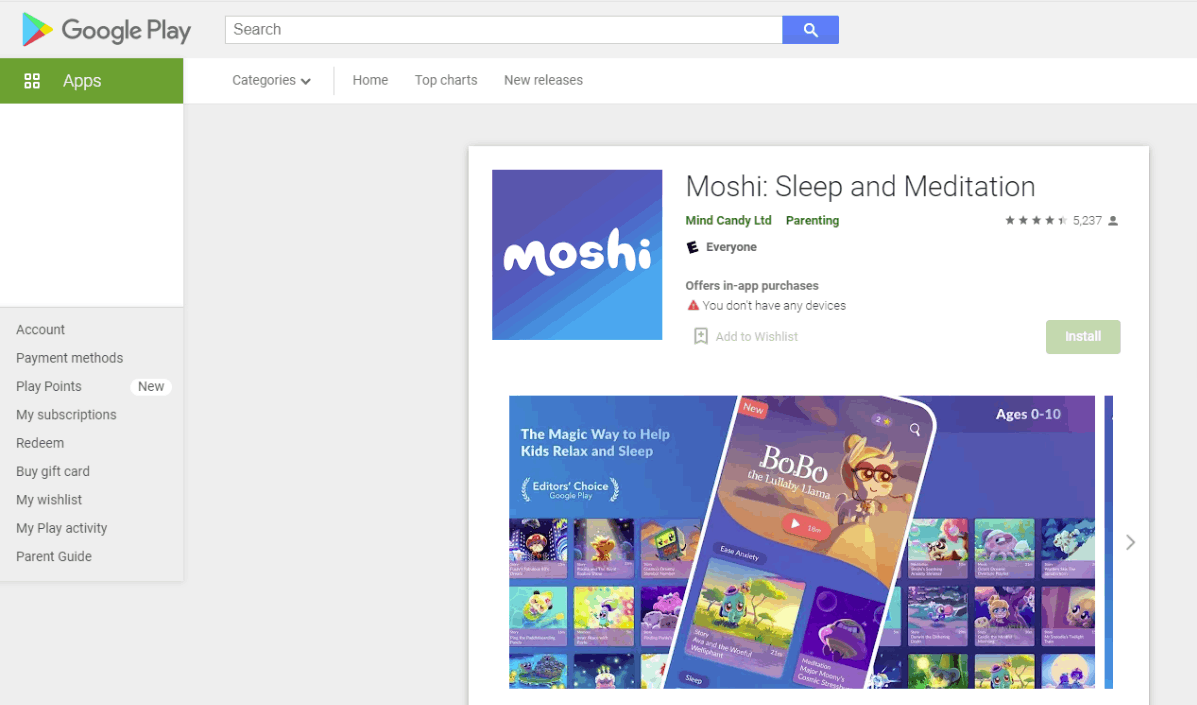
The Moshi app is quite popular and has been downloaded more than 1 million times.
The Android version of the app is currently rated at 4.4 out of 5 stars based on more than 5,000 user reviews.
Downloading and Installing the Android App
The Moshi app has a file size of 20 MB and will require your device to run on Android 7.0 and up in order to function properly.
It is currently on version 5.9.0 and was last updated on September 28, 2021.
To begin download and installation, simply tap on the Install button and wait for the download process to finish. Once all files are completely downloaded, it will automatically install on your device.
Moshi App for iOS Devices
Meanwhile, iOS users must open the Apple App Store to look for the app. You will find it in the Health & Fitness category under the name “Moshi Kids: Sleep & Meditation”.
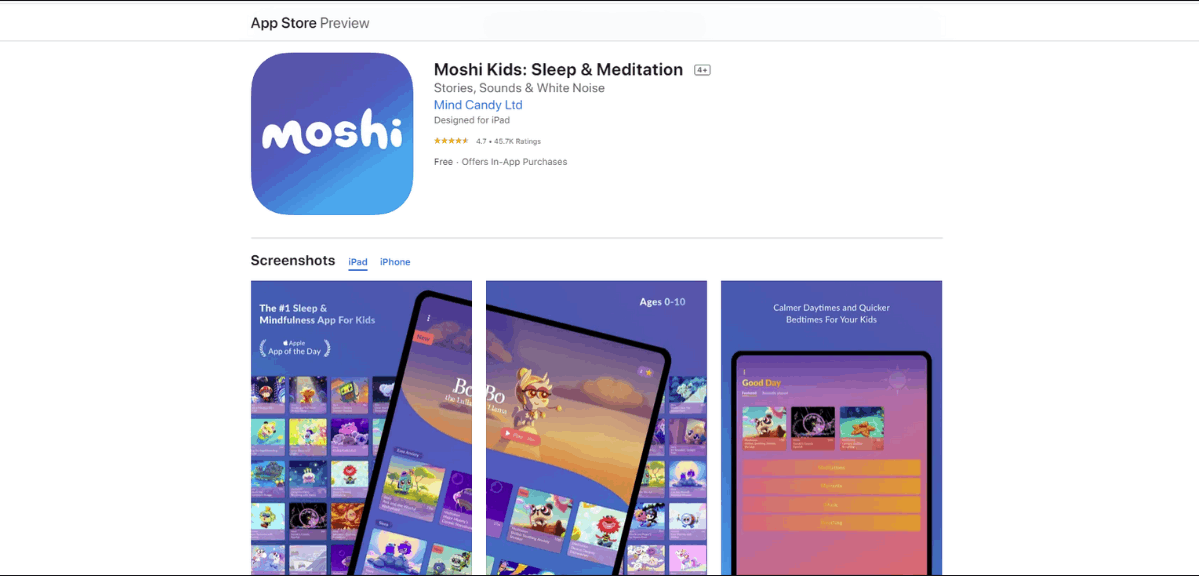
It has an age rating of 4+ and English is currently the only language available.
The iOS version of the Moshi app has a current rating of 4.7 out of 5 stars based on over 45,000 user reviews.
Downloading and Installing the iOS app
This version of the app requires iOS 12.0 or later for both the iPhone and the iPod touch.
It can also be used on an iPad provided that it runs iPadOS 12.0 or later and with Mac as long as it has macOS 11.0 or later.
To download and install the app, tap on the Get button and it will automatically start downloading the files. Once download is complete, it will immediately start installing on your device.
Conclusion
While there are various strategies available to help children overcome sleep problems, not all people have the time to implement them. I think that that the Moshi app is a useful tool to help children fall asleep faster and stay asleep longer.
However, I still think that the app can be used in combination of other activities mentioned here that could help alleviate these sleep problems. In the end, our goal is to give our children more sleep for their development and health.




